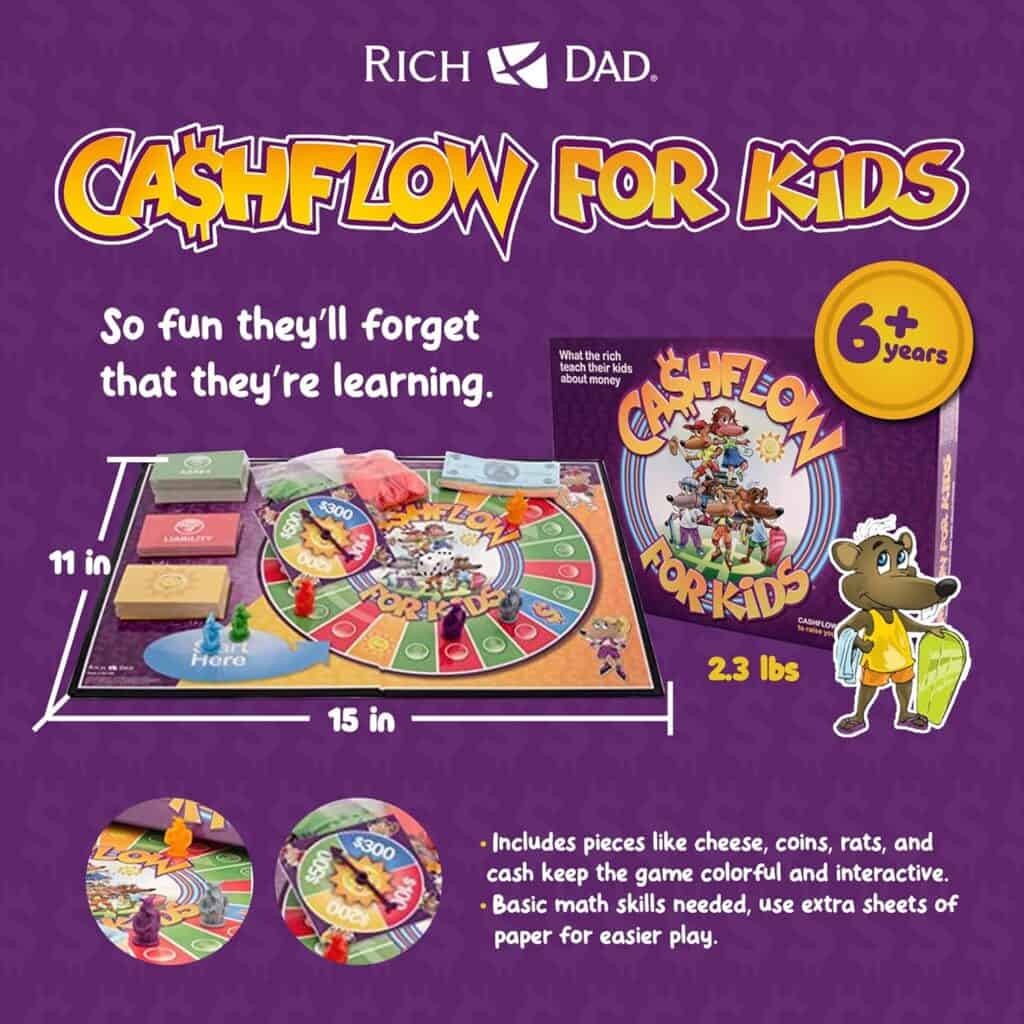25 Math Board Games Kids Love and Teachers Approve!
Who says math can’t be exciting? Math board games add a hands-on, interactive twist to learning, allowing students to practice essential skills while enjoying the fun of friendly competition.
From basic operations to complex concepts like geometry and patterning, these games cover it all. Plus, incorporating games into the classroom fosters teamwork, critical thinking, and a love for learning!
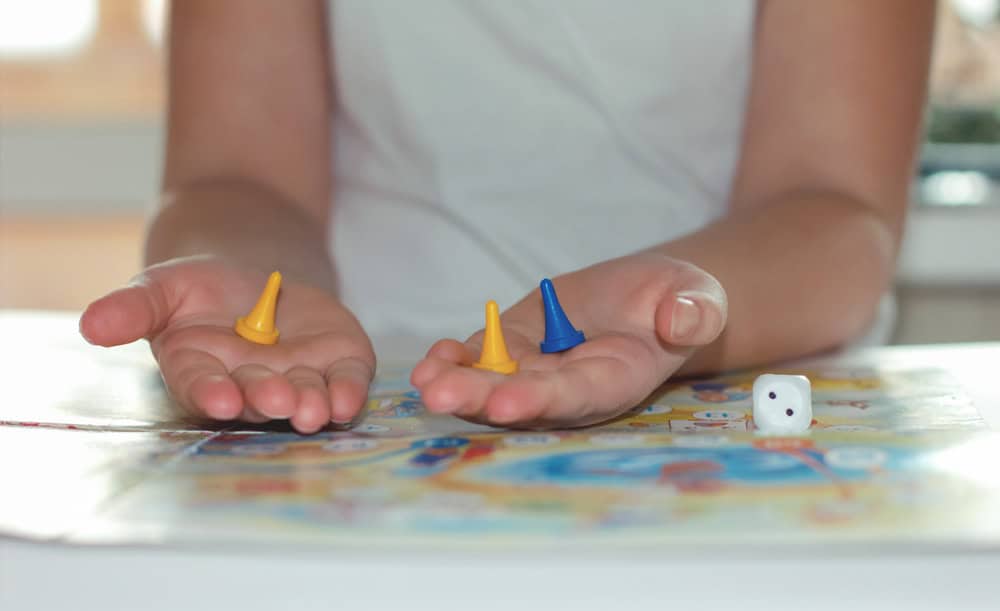
In this article, I’ve hand-picked a list of math board games that are perfect for elementary students in the second plane of development. These Montessori-aligned math activities can easily be integrated into both classroom and home settings to enhance students’ math skills.
As the holiday season approaches, consider these math board games as excellent holiday gift ideas for kids. They make for good holiday gifts that not only entertain but also promote essential math skills and learning in a fun way!
💡🔢💡🔢💡
Our Top 5 Favorite Math Board Games
Blokus
Cash Flow for Kids
Multiplication Board Game
Battleship
Pet Me
Now, let’s explore all 25 math board games, there’s sure to be a perfect fit for your elementary students!
25 Math Board Games for Elementary Students
When kids play math games, they experience learning in disguise, building important skills without even realizing it! These games are a must-try for your elementary-aged children.
1. Sum Swamp
- Age Group: 5+ years
- Skills Practiced: Addition, subtraction
- Explanation: In Sum Swamp, kids get to explore a swamp setting using animal game pieces that young learners adore. This simple game is designed to make math accessible and enjoyable, helping kids gain confidence as they solve basic addition and subtraction problems to move forward. Each turn brings a new opportunity for kids to practice their skills in a fun, low-pressure environment, making math feel more like an adventure than a lesson.
2. Prime Climb
- Age Group: 10+ years
- Skills Practiced: Multiplication, division, prime numbers
- Explanation: Prime Climb is a vibrant, engaging game that introduces students to prime numbers, multiplication, and division in a way that’s easy to learn yet endlessly replayable. Thanks to its unique blend of strategy and luck, this game is great for strengthening math fact knowledge while encouraging players to think strategically. With every turn, students practice predicting moves ahead, similar to chess, making this math board game one that goes beyond basic math skills to foster deep mathematical thinking and problem-solving.
3. Monopoly
- Age Group: 8+ years
- Skills Practiced: Counting, money, simple math operations
- Explanation: Monopoly is a classic family game that gives kids a fun, hands-on way to practice math skills. As players move around the board, they add dice numbers, learn the value of each bill, and count money to pay for properties, rent, and fines. Kids also get real-world experience making change for others, helping them build confidence with addition, subtraction, and financial decision-making. This makes Monopoly a great choice for family game night, where math practice feels more like play than homework.
4. Addition and Subtraction Bingo Game
- Age Group: 6+ years
- Skills Practiced: Addition, subtraction
- Explanation: Addition and Subtraction Bingo is an engaging twist on the classic bingo game, designed to help kids build math skills with enthusiasm. This game offers two different versions, one for addition and one for subtraction, making it versatile for various skill levels. Unlike typical bingo games, this set includes fun variations like cooperative bingo, frame bingo, and four-corner bingo, providing new ways to play. Alongside mastering math facts, students practice hand-eye coordination and reaction time, keeping them excited about learning through play.
5. Tangram City
- Age Group: 10+ years
- Skills Practiced: Patterning, spatial reasoning
- Explanation: Tangram City invites players into a kingdom where the queen challenges participants to build new cities. Players must balance functionality and aesthetics, striving to create harmony between human development, represented by black tiles, and natural spaces, symbolized by green tiles. At the end of each round, points are awarded for the largest rectangle created, while bonus points are given at the end of the game for successfully bridging the realms of nature and development.
6. Blokus
- Age Group: 7+ years
- Skills Practiced: Geometry, spatial reasoning
- Explanation: Blokus is an engaging and easy-to-set-up math board game that’s perfect for younger players or those new to board games. Each round brings a new challenge as players attempt to strategically place their pieces on the board, blocking opponents while finding space for their own. Each player’s unique strategy adds to the fun, keeping each game fresh and challenging. This math board game promotes critical thinking and spatial reasoning, making it both entertaining and educational.
7. Pizza Fraction Game
- Age Group: 6+ years
- Skills Practiced: Fractions, equivalencies
- Explanation: The Pizza Fraction Game combines a multi-sensory experience with the fun of pizza-making, appealing naturally to kids’ imaginations and appetites! With seven different ways to play, students can explore fractions through identifying, matching equivalents, and performing basic operations like addition and subtraction. The variety of challenges within each game keeps gameplay dynamic, ensuring it’s suited for different skill levels and ages. This versatility helps reinforce fraction concepts while engaging students in an exciting way – because what kid doesn’t love making pizza?
💡 Keep the Learning Fun with Math Games!
Check out our blog 11 Montessori-Aligned Math Games for engaging, hands-on activities that make learning math enojoyable. There’s even a fraction pizza game that elementary kids will love to take a bite out of – math has never been so delicious!
8. Adsumudi Math Game
- Age Group: 9+ years
- Skills Practiced: Multiplication, division, addition, subtraction
- Explanation: Adsumudi is a dynamic math game that helps players think more mathematically while having fun. The game keeps basic math skills sharp and exercises problem-solving abilities in diverse ways. Whether played solo or with a group, Adsumudi encourages players to solve problems creatively, showcasing how different equations can lead to the same solution.
9. Math Island Addition & Subtraction Board Game
- Age Group: 6+ years
- Skills Practiced: Addition, subtraction
- Explanation: Math Island is a lively, fast-paced adventure where players race to escape Math Island using their addition and subtraction skills. Players roll the dice to generate equations, solve the math problem, and move along the board by the resulting number of spaces. This interactive game transforms math practice into an exciting adventure, making addition and subtraction practice both entertaining and effective. It’s a perfect way for kids to reinforce essential math skills while enjoying the thrill of a fun and challenging game!
💡 Roll Into More Learning Fun!
Looking for even more creative ways to make math fun? Check out our blog 21 Math Games with Dice for engaging activities that sharpen math skills.
Plus, read 15 Educational Games With Three Dice for Kids for five math-focused games and a FREE printable dice template.
These math activities are perfect for classrooms or family game nights!
10. Outnumbered: Improbable Heroes Math Board Game
- Age Group: 8+ years
- Skills Practiced: Addition, subtraction, multiplication, division, squaring
- Explanation: Outnumbered is an action-packed game where players work as a team to help superheroes defeat villains by using mental math skills. Up to six players can join forces to stop villains from capturing the Infinity Generator and taking over the city! Each villain has a target number, and players roll three dice to manipulate the numbers through addition, subtraction, multiplication, division, or squaring to reach the target. With three levels of play this game grows with players as they advance their skills.
11. The Genius Square
- Age Group: 6+ years
- Skills Practiced: Spatial awareness, geometry, logic, pattern recognition, fine motor skills
- Explanation: The Genius Square is simply genius in its simplicity and engagement! This clever puzzle game promotes essential skills like problem-solving and motor manipulation. To play, roll the seven dice and place blockers on the grid at the coordinates shown. From there, it’s a race to fill every remaining space on the board with your pieces, making it an exciting challenge that keeps players thinking strategically. This game is ideal for players of all ages, so the whole family can join in on the fun! Plus, it’s versatile enough to be played solo, making it a great choice for those who enjoy personal challenges as well as competitive play.
💡 More Hands-On Geometry Fun!
Learn how to fold a 2D net into a 3D cube with our step-by-step tutorial. You’ll find free printable dice and bonus game in there to make learning geometry interactive and fun!
12. Mobi Math
- Age Group: 8+ years
- Skills Practiced: Addition, subtraction, multiplication, division
- Explanation: Mobi Math is an engaging, educational game that brings a fun twist to math practice with its crossword-style layout, though it doesn’t require a traditional board. Each player draws number and operation tiles from a central pile and starts connecting their tiles to form math equations. The challenge is to create a complete, interlocking grid of equations, similar to a math-based Scrabble. This is a fast-paced, hands-on way to reinforce math skills like addition, subtraction, multiplication, and division. This setup not only sharpens math facts but also encourages kids to build their own equations while competing in an enjoyable, strategic game format.
13. Cash Flow for Kids
- Age Group: 6-10 years
- Skills Practiced: Financial literacy, basic math, critical thinking
- Explanation: Cash Flow is a dynamic math board game designed to introduce kids to essential financial literacy concepts in a hands-on, fun way. Players engage in scenarios related to stock investing, real estate, and building businesses, allowing them to develop skills in managing income, assets, and expenses. By focusing on key concepts like income vs. expenses and assets vs. liabilities, Cash Flow helps kids form positive money habits and strategies for building financial stability and even legacy wealth.
14. Money Bags
- Age Group: 7+ years
- Skills Practiced: Counting skills, money management, basic math skills
- Explanation: Money Bags is an engaging math board game that teaches kids money skills as they play. Players move along a colourful game board, collecting, counting, and exchanging realistic-looking fake money to reach the finish line. The game provides a fun challenge that builds confidence in counting and handling money. Simple enough to play quickly, yet challenging enough to keep kids engaged, Money Bags offers an ideal mix of gameplay and education, making it perfect for building practical money skills in young learners.
15. Managing My Allowance
- Age Group: 8+ years
- Skills Practiced: Financial literacy, wants vs. needs, goal setting
- Explanation: Managing My Allowance is a math board game that provides children with a real-life math experience as they navigate financial decisions in a fun and interactive way. In this game, players must save for college while taking advantage of sales and making smart choices with their money. The objective is to accumulate the most college savings by the end of the game, encouraging players to think critically about their spending and saving habits. As they manage their allowance and earnings from real-world tasks, kids learn to distinguish between wants and needs, making this a highly useful, hands-on money management game that keeps them motivated to learn.
16. Shut The Box Dice Game
- Age Group: 6+ years
- Skills Practiced: Addition, subtraction, mental math, strategic thinking
- Explanation: In Shut The Box, players take turns rolling the dice and then must choose a combination of tiles to flip down that corresponds to the total rolled. For example, if a player rolls a 7, they might choose to flip down the tiles showing 7, or they could choose to flip down the tiles showing 3 and 4. The goal is to flip down as many tiles as possible, ideally shutting the box completely. If a player cannot make a valid move, their turn ends, and the game continues to the next player. This game not only provides fun but also encourages players to develop their math skills, particularly in addition and subtraction.
17. Race to Infinity
- Age Group: 6-12 years
- Skills Practiced: Addition, subtraction, multiplication, division
- Explanation: In Race to Infinity, players navigate a colourful board, drawing cards that present various math problems. Each correctly solved problem allows players to advance their game piece along the path towards infinity. The game combines elements of strategy and chance, making it both educational and entertaining. It’s a fantastic way for kids to practice math in a fun, competitive environment, encouraging teamwork and collaboration as they sometimes work together to solve problems or strategize their moves.
18. BankIt!
- Age Group: 8+ years
- Skills Practiced: Logical reasoning, problem-solving
- Explanation: In BankIt! players embark on a financial literacy journey, managing virtual bank accounts, earning money, and making spending decisions. The game introduces kids to the concepts of saving, investing, and making wise financial choices in a playful environment. Through various activities and challenges, players will learn how to track their money and understand the value of making informed decisions about their finances. With interactive gameplay, BankIt! transforms financial literacy into an exciting learning experience.
19. Say Cheese Multiplication Game
- Age Group: 7+ years
- Skills Practiced: Multiplication, problem-solving
- Explanation: Say Cheese Multiplication Game is a lively and educational board game designed to help kids practice their multiplication skills while having fun. Players take on the role of photographers aiming to capture the best cheese photos for a contest. To advance in the game, they must answer multiplication questions correctly. The game includes colourful game pieces, engaging visuals, and a friendly competition aspect that motivates children to improve their math fluency. As they roll the dice and move around the board, players will encounter various multiplication problems that they must solve, making the learning process dynamic and interactive.
20. NumHunt
- Age Group: 8-12 years
- Skills Practiced: Addition, subtraction, multiplication, division
- Explanation: NumHunt offers a captivating gaming experience where players navigate a mysterious maze while solving math problems to advance. With its charming animal characters, the game engages children and makes learning math concepts enjoyable. The interactive gameplay provides a supportive environment for kids to deepen their understanding of various mathematical principles. Additionally, the game features adjustable difficulty levels, ensuring that it remains accessible for learners of different skill sets.
21. Multiplication Board Game
- Age Group: 8-12 years
- Skills Practiced: Multiplication, math facts speed and accuracy
- Explanation: The Multiplication Board Game makes learning multiplication facts an exciting challenge for students. Players throw two dice numbered from 1 to 10, multiply the resulting numbers, and race to occupy the corresponding answer on the game board with their piece. This fast-paced game engages kids and builds their confidence in multiplication while providing a fun, errorless method of learning. With no complex rules to follow, the simplicity of the game allows both players to compete simultaneously, adding to the excitement as they strive to find answers first.
22. Battleship
- Age Group: 7+ years
- Skills Practiced: Coordinate grids, logical thinking, game strategy
- Explanation: Battleship is a classic board game that not only provides entertainment but also serves as an excellent tool for elementary students to practice their math facts. The game involves players strategically placing their ships on a grid and then attempting to locate and sink their opponent’s ships by calling out coordinates. This setup inherently incorporates several mathematical concepts that can be beneficial for young learners.
23. Dino Math Tracks
- Age Group: 6-10 years
- Skills Practiced: Addition, subtraction, place value
- Explanation: Dino Math Tracks is a fun board game designed to help students build a solid foundation in math concepts, particularly in place value and basic operations. In this lively adventure, players race dinosaurs across a vibrant game board while solving math word problems. As players move their dinosaurs forward, they encounter challenges that require them to identify place values and perform simple addition and subtraction. This hands-on approach makes learning math more interactive and fun, which usually enhances retention and understanding. It’s a great math board game that transforms traditional learning into an exciting adventure.
24. Super Math Spy Board Game
- Age Group: 8+ years
- Skills Practiced: Addition, subtraction, multiplication, division
- Explanation: In Super Math Spy Board Game, players don their spy glasses and embark on a mission to solve math mysteries. The gameplay is straightforward and easy to learn, making it accessible for kids of various ages. By using the operations on the dice, players create simple math equations that help them progress through the game. This game offers a fantastic alternative to traditional math workbooks, transforming math practice into an interactive adventure. As players solve puzzles and complete challenges, they develop essential math skills while enjoying a thrilling spy experience.
25. Pet Me
- Age Group: 7+ years
- Skills Practiced: Multiplication, Division, mental math
- Explanation: Pet Me is an exciting math board game that takes kids on a fun pet park adventure, where they feed dogs, cats, and parrots while mastering multiplication and division facts. Players use a mix of cards and dice to advance, promoting teamwork and social skills through interactive play. This game makes division clearer and more relatable, transforming math practice into an engaging experience that kids will love. Pet Me combines learning with fun, ensuring that math feels relevant and enjoyable for young learners.
Benefits of Math Board Games for Kids
Math board games bring several benefits to the table, beyond just being fun. Here are a few reasons why you should consider adding them to your teaching toolkit:
Engagement and Motivation
Learning through play is often more enjoyable for children. Board games offer a relaxed, stress-free environment where students can practice math skills without the pressure of formal assessments.
Cooperation and Social Skills
Many board games encourage collaboration, turn-taking, and respectful competition. They help students develop communication and teamwork skills as they work through math challenges together.
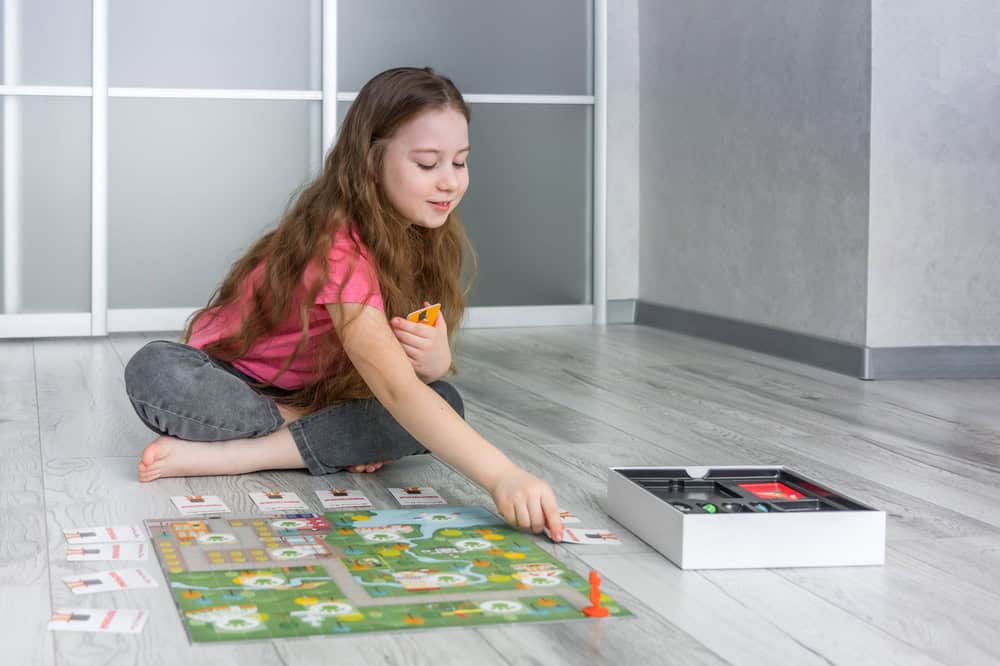
Critical Thinking
Math board games often require students to think strategically, solve problems, and apply their mathematical knowledge in new contexts. This can sharpen their logical reasoning abilities.
Variety in Learning
For students who might struggle with traditional worksheets or textbooks, math board games provide an alternative way to practice math skills that may be more aligned with their learning style.
Math Card Games Are Fun Too!
While we’re over here raving about math board games, it’s worth mentioning that math card games can also be a fun and effective way to reinforce essential math skills. These games are often easier to set up and play, making them perfect for quick educational sessions at home or in the classroom.
Practicing addition, subtraction, multiplication, or pattern recognition becomes exciting with a variety of fast-paced card games designed to help students master key concepts.
Games like Monopoly Deal and Clumsy Thief encourage friendly competition, allowing students to sharpen their math skills while fostering a lively learning environment that even the most reluctant mathematicians can enjoy.
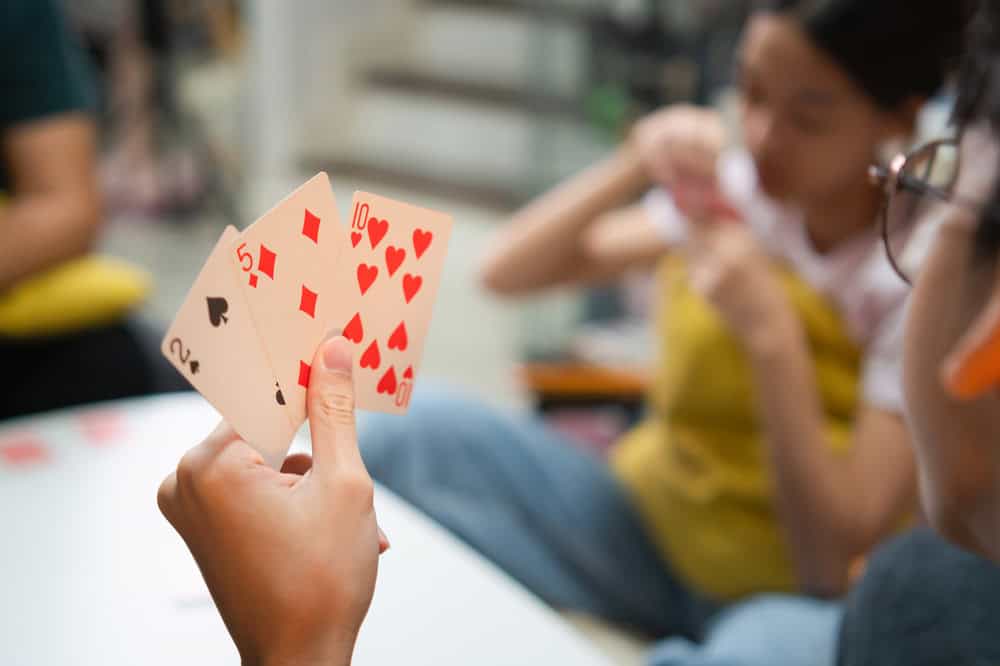
Additionally, math card games offer the flexibility to adapt the difficulty level based on the players’ abilities, making them accessible to a wide range of learners. They can be played solo or in groups, promoting collaboration and social interaction among peers. This interactive aspect enhances students’ math fluency and helps develop critical thinking and strategic skills as they decide how to use their cards effectively.
By integrating math practice into card games, teachers and parents can create enjoyable learning experiences that make mastering math concepts feel less like work and more like play.
The next time you’re looking to strengthen your child’s math skills and don’t have math board games on hand, consider playing math card games instead!
💡Try This Math Card Game!
Check out our blog, Elevate Elementary Math Skills with This Exciting Card Game, for a simple, engaging activity perfect for elementary-aged kids!
The Wrap-Up: Math Board Games
Math board games are an excellent way to turn learning into an enjoyable and interactive experience. From basic operations to more complex skills like geometry and problem-solving, these games help elementary students practice math in a playful, engaging way.
By combining fun with education, these games help foster a lifelong love of math while building critical skills that will serve kids for years to come.
📌 Save this awesome list on your Pinterest page for reference.
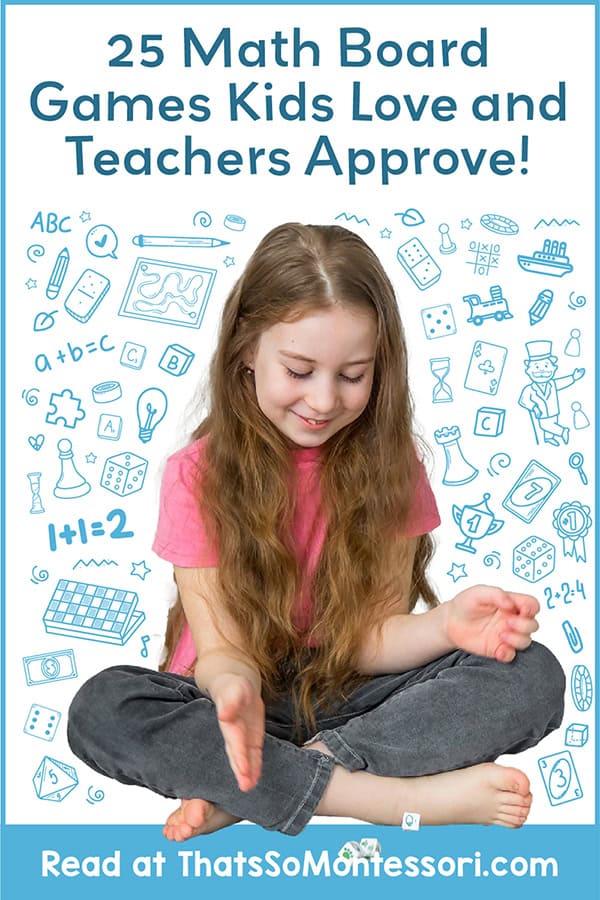
Be sure to check out our other blogs with fun educational games:
11 Ways to Use Our Roll A Story Dice Game
The Ultimate 13 Vocabulary Development Activities for Kids
15 Exciting Library Scavenger Hunt Ideas To Do With This Printable
8 Easy Rebus Puzzles with Answers Plus a Free Printable
13 Fun Ways To Use Quotes In Elementary Learning
Rebus Puzzles for Kids: A Comprehensive Riddle-Solving Guide
11 Amazing Outschool Classes That Make Me Excited for Kids
9 Interesting Activities to do with Rebus Picture Puzzles















